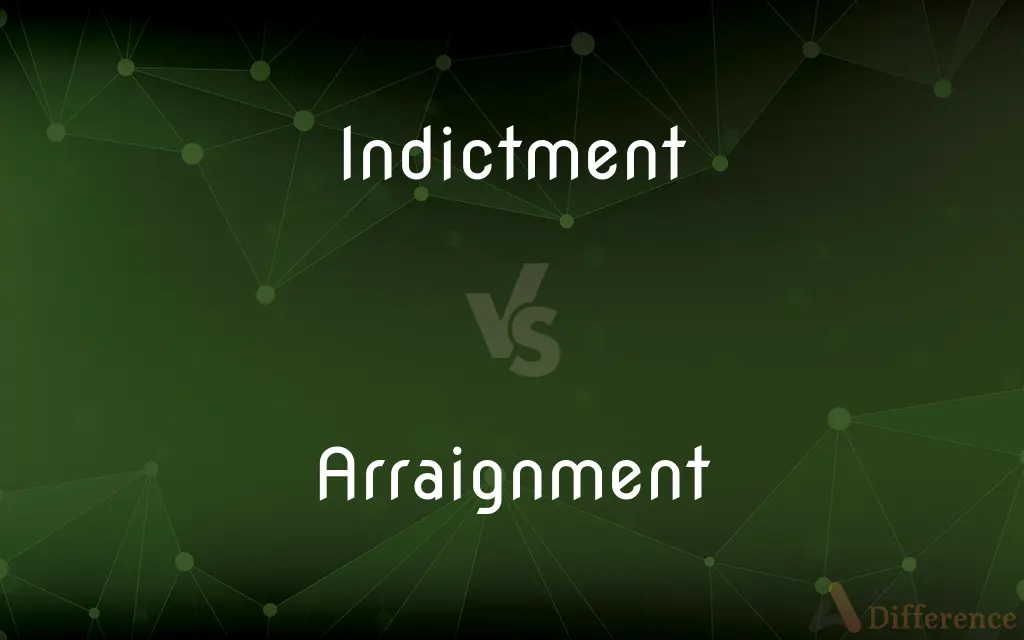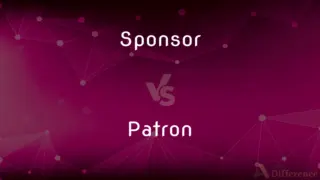Indictment vs. Arraignment — What's the Difference?
An indictment is a formal charge issued by a grand jury alleging a person has committed a crime. An arraignment follows the indictment, where the accused is formally read the charges and asked to enter a plea.

Difference Between Indictment and Arraignment
Table of Contents
ADVERTISEMENT
Key Differences
An indictment is a crucial step in the legal process, where a grand jury reviews evidence presented by a prosecutor and decides whether there is sufficient cause to believe that a person has committed a crime. It is typically used for serious felonies. An arraignment is the courtroom proceeding that follows an indictment or other formal charges. During arraignment, the accused is officially informed of the charges and asked to enter a plea, such as guilty, not guilty, or no contest.
The grand jury involved in an indictment is a group of citizens tasked with determining whether there is probable cause to charge someone with a crime, based on evidence presented by the prosecution. This process is usually secretive and one-sided, with only the prosecution presenting evidence. In contrast, an arraignment is an open court procedure where the defendant has the right to be present, often with legal representation, to hear the formal charges and respond to them.
While an indictment is the formal accusation that initiates criminal proceedings, not all criminal charges start with an indictment. In some cases, especially for less severe charges, the process might begin with an information or complaint filed by the prosecutor. However, the arraignment takes place regardless of how the charges are initiated, marking the defendant's first official court appearance in the criminal process.
The indictment process is primarily used in the United States federal court system and some state jurisdictions, adhering to the Fifth Amendment's requirement for a grand jury in federal felony charges. Arraignment procedures, while varying slightly from jurisdiction to jurisdiction, are a standard practice in the U.S. legal system, ensuring that the accused understands their rights and the nature of the charges against them.
After the arraignment, the criminal justice process continues with pretrial motions, potential plea negotiations, and possibly a trial. The indictment and arraignment stages are crucial for setting the stage for these subsequent steps, establishing the formal legal framework within which the accused will defend against the charges.
ADVERTISEMENT
Comparison Chart
Definition
Formal charge issued by a grand jury
Court proceeding where charges are read and plea is entered
Purpose
To formally accuse someone of a crime based on probable cause
To inform the defendant of the charges and obtain a plea
Process
Conducted by a grand jury, usually in secret
Open court procedure, defendant has the right to legal representation
Outcome
Leads to criminal charges if the jury finds probable cause
Leads to the setting of a trial date if a plea of not guilty is entered
Used for
Serious felonies, primarily in federal cases
All criminal charges, following indictment or direct filing by the prosecutor
Compare with Definitions
Indictment
A formal accusation made by a grand jury suggesting probable cause for a crime.
The grand jury returned an indictment against the defendant for embezzlement.
Arraignment
The first court appearance where charges are formally read.
During the arraignment, the judge read the charges against the defendant.
Indictment
Initiated by the presentation of evidence by the prosecution.
The prosecutor presented key evidence to the grand jury, leading to the indictment.
Arraignment
Allows the defendant to enter a plea.
At his arraignment, the defendant pleaded not guilty to the charges.
Indictment
Determines if a case should proceed to trial.
The indictment marked the beginning of legal proceedings against the accused.
Arraignment
Can lead to discussions about bail or release conditions.
The arraignment included a hearing on the defendant's bail conditions.
Indictment
Used for serious crimes, often in federal courts.
For major federal offenses, an indictment is typically the first step in the legal process.
Arraignment
Ensures the defendant understands their rights.
The judge explained the defendant's legal rights at the arraignment.
Indictment
Ensures that accusations of serious crimes are reviewed by citizens.
The grand jury's role in the indictment process ensures community involvement in the justice system.
Arraignment
Sets the stage for further legal proceedings, such as trials.
Following the arraignment, the court scheduled a date for the preliminary hearing.
Indictment
An indictment ( in-DYT-mənt) is a criminal accusation that a person has committed a crime. In jurisdictions that use the concept of felonies, the most serious criminal offence is a felony; jurisdictions that do not use the felonies concept often use that of an indictable offence, an offence that requires an indictment.
Arraignment
Arraignment is a formal reading of a criminal charging document in the presence of the defendant, to inform them of the charges against them. In response to arraignment, the accused is expected to enter a plea.
Indictment
A set of written criminal charges issued against a party, where a grand jury, under the guidance of a prosecutor, has found that sufficient evidence exists to justify trying the party for that crime.
Arraignment
(Law) To call (an accused person) before a criminal court to hear and answer the charge made against that person.
Indictment
The act or process of obtaining such charges.
Arraignment
To call to account; accuse
“Johnson arraigned the modern politics of this country as entirely devoid of all principle” (James Boswell).
Indictment
A document or other communication that makes accusations of wrongdoing or describes an unacceptable situation
"[the book, an] exhaustively researched indictment of the fast-food industry" (Suzanne Schlosberg).
Arraignment
(legal) The formal charging of a defendant with an offense.
Indictment
(legal) An official formal accusation for a criminal offence, or the process by which it is brought to a jury.
Arraignment
The act of arraigning, or the state of being arraigned; the act of calling and setting a prisoner before a court to answer to an indictment or complaint.
Indictment
(legal) The official legal document outlining the charges concerned; bill of indictment.
Arraignment
A legal document calling someone to court to answer an indictment
Indictment
An accusation of wrongdoing; a criticism or condemnation.
Indictment
Evidence of failure or poor performance.
An indictment of his ability to lead
An indictment of his game
Indictment
The act of indicting, or the state of being indicted.
Indictment
The formal statement of an offense, as framed by the prosecuting authority of the State, and found by the grand jury.
Indictment
An accusation in general; a formal accusation.
Indictment
A formal document written for a prosecuting attorney charging a person with some offense
Indictment
An accusation of wrongdoing;
The book is an indictment of modern philosophy
Common Curiosities
Is an indictment required for all criminal charges?
No, indictments are typically required for serious felonies, especially in federal cases. Lesser charges may start with an information or complaint.
What are the possible pleas a defendant can enter at arraignment?
The defendant can plead guilty, not guilty, or, in some jurisdictions, no contest (nolo contendere).
Can a defendant be arraigned without an indictment?
Yes, arraignment can follow charges initiated by an information or complaint, not just an indictment.
What happens if a grand jury does not indict?
If a grand jury decides not to indict, it means they found insufficient evidence for the charges, and the case may not proceed to trial unless new evidence emerges.
Are arraignments public?
Yes, arraignments are generally public proceedings, unlike the typically secretive grand jury process for indictments.
What is the difference between a grand jury and a trial jury?
A grand jury decides whether there is enough evidence for charges, while a trial jury determines the defendant's guilt or innocence after hearing evidence in court.
Does the defendant need a lawyer at arraignment?
It is highly advisable for the defendant to have legal representation at arraignment to ensure their rights are protected and to make informed decisions about their plea.
Can a case proceed to trial without an arraignment?
No, arraignment is a necessary step where the defendant is formally charged and enters a plea, setting the stage for further proceedings.
What happens after an indictment is issued?
After an indictment, the next step is usually the arraignment, followed by pretrial proceedings and potentially a trial.
What happens if a defendant does not enter a plea at arraignment?
If a defendant refuses or is unable to enter a plea, the court may enter a not guilty plea on their behalf to allow the case to proceed.
Is bail always discussed at arraignment?
While not always the case, bail or pretrial release conditions are commonly addressed during arraignment, especially in more serious cases.
What is the role of the prosecutor during arraignment?
The prosecutor outlines the charges against the defendant and may discuss bail conditions or plea offers.
Can a defendant waive their right to arraignment?
In some jurisdictions, defendants can waive their right to a formal arraignment, particularly if they intend to plead not guilty and are familiar with the charges.
Can charges be added or changed after an indictment?
Yes, additional charges can be added or existing charges can be modified by the prosecution, sometimes requiring a new indictment or superseding indictment.
How long after an indictment does arraignment occur?
The timing can vary, but arraignment typically occurs shortly after the indictment is issued, adhering to the defendant's right to a speedy trial.
Share Your Discovery

Previous Comparison
Sponsor vs. Patron
Next Comparison
Scrub vs. Legit















































